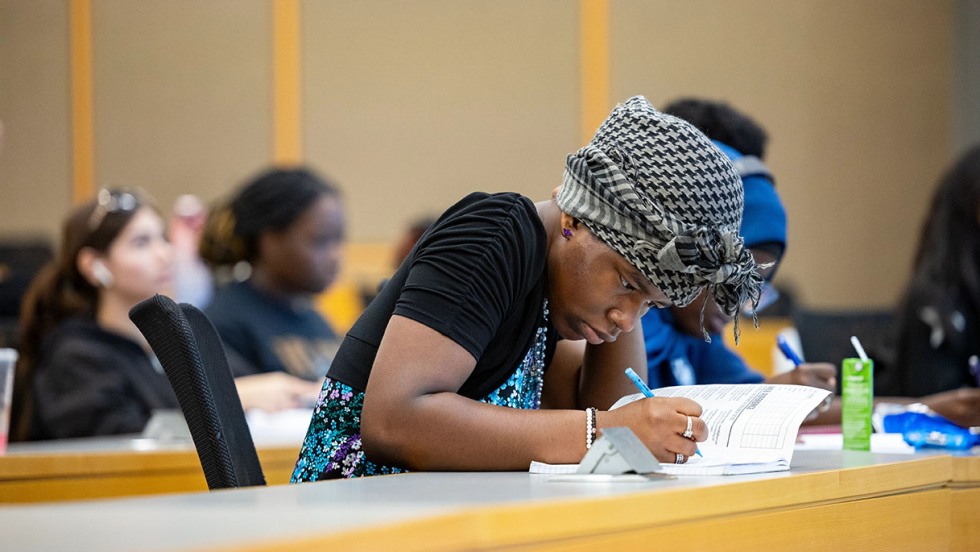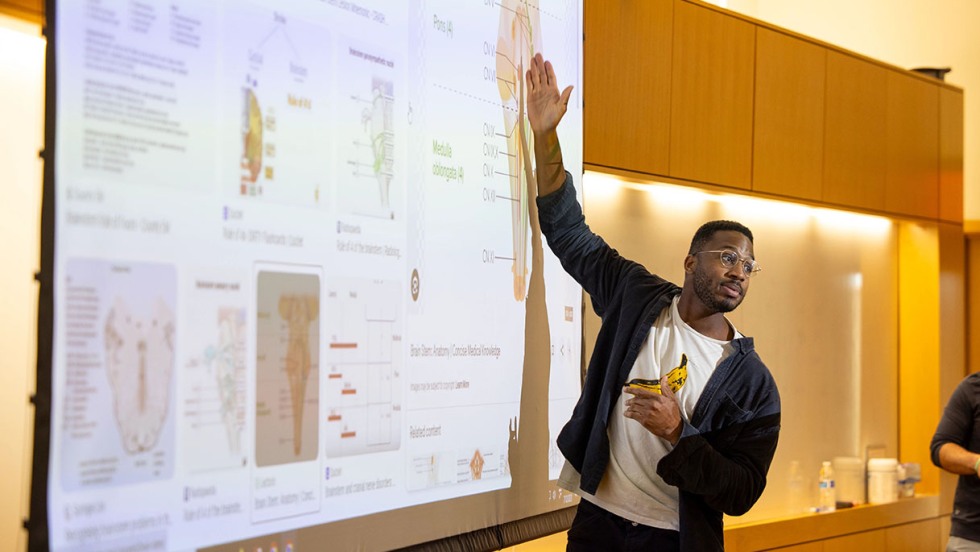PROVIDENCE, R.I. [Brown University] — The high schoolers in the mid-July class were doing what teens do: snapping cell phone photos and enthusiastically commenting on each other’s shots. But the images on their phones were a bit atypical: they were magnified versions of cells from human body organs.
For that day’s session on pathology — part of the HealthCORE pathways program at Brown University’s Warren Alpert Medical School, which introduces careers in medicine — Brown faculty member Dr. Corey Hanley shared details about her job as a pathologist. She used microscope slides to show the teens how she identifies abnormalities and makes patient diagnoses to help influence treatment plans.
Looking up from a microscope, one student exclaimed: “This is awesome — I want to do this!”
The goal of HealthCORE is to elicit reactions just like that one. The two-week summer program, which largely enrolls students from groups historically underrepresented in medicine, exposes teens to careers in health, teaches them important skills and connects them with professionals who can encourage their interests. This year 14 students met daily at Brown’s medical school to hear from speakers and explore hands-on health activities, from administering a physical exam to dissecting a cow’s heart to examining microscopic cells. They also delved into areas such as narrative medicine, health policy, medical ethics and public health.
Faculty members who led this year’s sessions described their daily routines and shared details about the path they took to their career of choice. Hanley, for example, told students about her medical residency and answered questions about the typical salary, hours and lifestyle for pathologists.
Hearing directly from professionals about the ins and outs of their careers, as well as their educational journeys, allows students to envision themselves in those same roles, said Luckson Omoaregba, director of pathways programs at the Warren Alpert Medical School.
“Learning about the day-to-day activities of a variety of health professionals, as well as what those people love about their jobs and what they find challenging, helps high school students think about these careers in the context of their own lives,” Omoaregba said. “It gets them thinking, ‘This sounds like something I’d like; this sounds like something I could do.’”
HealthCORE is part of a network of educational pathways programs at the medical school. While there’s some curriculum overlap with the Week of Medicine program, HealthCORE is broader in scope.
“Both summer programs are exploratory and introductory in nature, but what they’re introducing is different,” Omoaregba said. “Week of Medicine focuses on the pathway to becoming a physician, while HealthCORE shows a day in the life of a variety of health professions.”
Despite their distinctions, both programs serve a similar goal: HealthCORE and Week of Medicine are intended to spark an interest that propels students down the path to medical school and motivates them to pursue careers in health.
The students who are drawn to these programs usually bring a nascent interest in science. Yuliana Bueno, a rising 10th grader from Providence who attends the Met School, was vocally enthusiastic about the pathology class and counted the anatomy session among her favorites.
“I came because I know I want to work in medicine,” Bueno said. “This program has strengthened my interest.”
Khairah Shiyanbola, a rising sophomore at the Rhode Island Nurses Institute Middle College Charter High School, said the program exceeded expectations. She said that the nursing skills she’s learning at RINI could be a stepping stone to other health careers, and she noted that HealthCORE introduced her to additional options.
“I’ve really enjoyed this program,” Shiyanbola said, noting that she especially enjoyed the medical interviews with mock patients. “The topics are so interesting, and the sessions are great.”
For high school students, by medical school students (and faculty)
Two second-year medical students, Michael-Evans James and Theodore Addo, organized and led HealthCORE this year.
“This age group has so much potential,” said James, a Florida native who earned a bachelor’s and master’s degrees in public health from Boston University. “It’s exciting to be able to create these experiences for them and talk to them about careers in health care. I didn’t have these kinds of opportunities in high school.”

